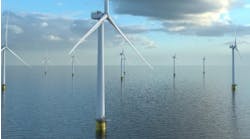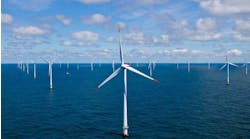Offshore staff
LONDON – The UK government’s latest Contracts for Difference (CfD) Auction Round 5 (AR5) for renewable energy has attracted no bids for new offshore wind farms, even though up to 5 GW was available.
Offshore Energies UK sustainability and policy director Mike Tholen said the outcome was “a matter of great concern given that offshore wind will be imperative to decarbonize our economy. It is a clear indicator that the system is in urgent need of attention. Our latest Economic Report figures show £80 billion [$99.87 billion] could be spent on offshore wind investments by 2030, but around half of this is waiting on final investment decisions from businesses that need to be presented with a commercially attractive offering…
“To deliver the UK’s ambitious wind targets, a policy reform must take place, and we will seek to work with government to revise the investment mechanism, implement proper pricing for generators and reduce the costs of doing business in the North Sea.”
Keith Anderson, ScottishPower CEO, said, “This is a multi-billion-pound lost opportunity to deliver low-cost energy for consumers and a wake-up call for government. The CfD process is recognized globally as a lynchpin of the UK’s offshore success, but it also needs to flex to keep pace with the world around it…
“ScottishPower is in the business of building wind farms, and our track record is second to none in terms of getting projects over the line when others haven’t been able to. But the economics simply did not stand up this time around.”
Co-Chair of the Offshore Wind Industry Council, Richard Sandford commented, “Although today’s auction results are disappointing, the offshore wind industry’s continued focus is working closely with the government to reform the auction process so that we can secure far more capacity next year and beyond.
“The UK has the second largest offshore wind pipeline in the world, with more than 100 projects at all stages of development…If all the offshore wind projects eligible to bid into this auction had done so, we could have powered the equivalent of more than 5 million British homes a year. So, lessons must be learned to ensure that the parameters of the auction are set correctly in the future.”
The association blamed the failure to attract offshore bids on the maximum power price being set too low, having been reduced by the government by £2 to £44/MWh ($54.92/MWh).
So far, only 27 GW has been secured of the government’s 50-GW offshore wind target for 2030 and future auctions will have to support 4.5 GW to 5.8 GW per year to get back on target.
RenewableUK CEO Dan McGrail said, “Industry has warned that rising costs should have been properly priced into this auction. If the UK isn’t offering prices that allow investors to make a return, they will simply invest elsewhere. These results should set alarm bells ringing in government, as the UK’s energy security and net zero goals can only be met if we have offshore wind as the backbone of our future energy system.”
RenewableUK’s executive director for Policy and Engagement, Ana Musat, added, “There has been a perfect storm of inflation, supply chain disruption and spiralling interest rates that mean the cost of financing and building offshore wind have risen sharply. Offshore wind remains the UK’s cheapest option for large-scale power, so slowing deployment will cost more and leave consumers exposed to volatile global gas markets for longer.
“We urgently need government to provide reassurance that next year’s auction round will offer investable parameters, and that in the longer term a joined-up strategy for maximizing the potential of the offshore wind sector is developed. As part of that, the industry needs to see credible plans to evolve the CfD to maximize deployment of our cheapest forms of electricity generation, a commitment to develop and fund supply chain growth and an internationally competitive fiscal regime which attracts capital into the UK”.
RenewableUK Cymru in Wales said the failed auction had included Erebus, the country’s first planned floating wind farm 40 km from the Pembrokeshire coast. The 100-MW test and demonstration wind farm of next-generation 14-MW turbines was due to be commissioned in 2026.
Association director Jess Hooper said, “As Wales’ first floating offshore wind project, Erebus is entirely dependent on this form of revenue support to succeed, and the success of Erebus is critically important not only to Wales and the wider South West region, but also for the UK government’s own floating offshore wind targets. This result will now delay investment decisions for developers, supply chain companies, ports and infrastructure, all with knock-on effects. Despite the industry’s clear warnings, the UK government has not taken inflationary costs and supply chain squeeze into account in this latest auction, focusing solely on competition through cost reduction.”
09.08.2023



